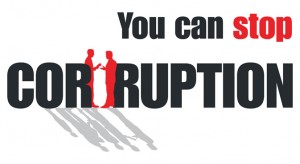Ghana ranks 61 out of 175 countries on 2014 Corruption Perceptions Index
 Ghana ranks 61 out of 175 countries on Transparency International’s (TI)’s 2014 Corruption Index released today December 3, 2014. The country has a total score of 48 points, an improvement from last year’s 46.
Ghana ranks 61 out of 175 countries on Transparency International’s (TI)’s 2014 Corruption Index released today December 3, 2014. The country has a total score of 48 points, an improvement from last year’s 46.
The country also occupies the 8th spot in sub-Sahara Africa where Botswana is on top. At the bottom of the table is Liberia.
According to Transparency International more than two thirds of the 175 countries in the 2014 Corruption Perceptions Index score below 50, on a scale from 0 (perceived to be highly corrupt) to 100 (perceived to be very clean). Denmark comes out on top in 2014 with a score of 92 while North Korea and Somalia share last place, scoring just eight.
The scores of several countries rose or fell by four points or more. The biggest falls were in Turkey (-5), Angola, China, Malawi and Rwanda (all -4). The biggest improvers were Côte d´Ivoire, Egypt, Saint Vincent and the Grenadines (+5), Afghanistan, Jordan, Mali and Swaziland (+4), it said.
The Corruption Perceptions Index is based on expert opinions of public sector corruption. Countries’ scores can be helped by open government where the public can hold leaders to account, while a poor score is a sign of prevalent bribery, lack of punishment for corruption and public institutions that don’t respond to citizens’ needs, the anti-corruption organization added.
Meanwhile, the latest finding of the Afrobarometer survey of the Ghana Centre for Democratic Development released Tuesday December 2, 2014 says most Ghanaians perceive “some,” “most,” or “all” of their government, law enforcement, and judicial officials as corrupt
A majority of citizens gave the same assessment of informal leaders such as business executives and traditional and religious leaders, the survey noted.
According to the survey, trends over time reveal that citizens’ perception of corruption has increased dramatically over the past decade despite a slight decrease since 2012. A large majority of Ghanaians are of the opinion that corruption has increased compared to the previous year. In addition, those who say the government has performed poorly in fighting this corrosive canker are in the majority. On the positive side, more than half of those interviewed expressed the belief that ordinary people can make a difference in the fight against corruption.
The following are some of the key findings of the survey:
– Large majorities of Ghanaians perceive corruption among “some,”, “most,” or “all” police officers (89%), national government officials (86%), members of Parliament (85%), judges and magistrates (85%), officials of the Ghana Revenue Authority (85%), district chief executives (84%), the president and officials in his office (83%), local government representatives (83%), officials of the Electoral Commission (81%), and business executives (82%). Lower but still large percentages hold the view that traditional leaders (78%) and religious leaders (69%) are engaged in corrupt practices.
– Over time, increasing numbers of citizens perceive their leaders as corrupt, with large percentage-point increases in this assessment regarding the president and officials in his office (36%), religious leaders (28%), members of Parliament (26%), local government representatives (23%), national government officials (20%), business executives (19%), judges and magistrates (15%), tax officials of the Ghana Revenue Authority (15%), the police (10%), and traditional leaders (10%). However, between 2012 and 2014, this perception declined marginally.
– Three-fourths (75%) of citizens believe corruption has increased compared to the previous year and 71% think government has performed “very badly” or “fairly badly” in tackling corruption.
– More than half (53%) believe that ordinary citizens can make a difference in fighting corruption.
– The most effective things that respondents believe Ghanaians can do to combat corruption is to report corruption when it occurs (25%) and refuse to pay bribes (23%).
By Emmanuel K. Dogbevi
